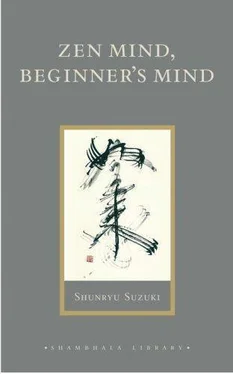The important thing in our understanding is to have a smooth, free-thinking way of observation. We have to think and to observe things without stagnation. We should accept things as they are without difficulty. Our mind should be soft and open enough to understand things as they are. When our thinking is soft, it is called imperturbable thinking. This kind of thinking is always stable. It is called mindfulness. Thinking which is divided in many ways is not true thinking. Concentration should be present in our thinking. This is mindfulness. Whether you have an object or not, your mind should be stable and your mind should not be divided. This is zazen.
It is not necessary to make an effort to think in a particular way. Your thinking should not be one-sided. We just think with our whole mind, and see things as they are without any effort. Just to see, and to be ready to see things with our whole mind, is zazen practice. If we are prepared for thinking, there is no need to make an effort to think. This is called mindfulness. Mindfulness is, at the same time, wisdom. By wisdom we do not mean some particular faculty or philosophy. It is the readiness of the mind that is wisdom. So wisdom could be various philosophies and teachings, and various kinds of research and studies. But we should not become attached to some particular wisdom, such as that which was taught by Buddha, Wisdom is not something to leam. Wisdom is something which will come out of your mindfulness. So the point is to be ready for observing things, and to be ready for thinking. This is called emptiness of your mind. Emptiness is nothing but the practice of zazen.
I discovered that it is necessary, absolutely necessary, to believe in nothing. That is, we have to believe in something which has no form and no color-something which exists before all forms and colors appear. This is a very important point. No matter what god or doctrine you believe in, if you become attached to it, your belief will be based more or less on a self-centered idea. You strive for a perfect faith in order to save yourself. But it will take time to attain such a perfect faith. You will be involved in an idealistic practice. In constantly seeking to actualize your ideal, you will have no time for composure. But if you are always prepared for accepting everything we see as something appearing from nothing, knowing that there is some reason why a phenomenal existence of such and such form and color appears, then at that moment you will have perfect composure.
When you have a headache, there is some reason why you have a headache. If you know why you have a headache, you will feel better. But if you do not know why, you may say, “Oh, I have a terrible headache! Maybe it is because of my bad practice. If my meditation or Zen practice were better I wouldn’t have this kind of trouble!” If you understand conditions in this way you will not have perfect faith in yourself, or in your practice, until you attain perfection. You will be so busy trying that I am afraid you will have no time to attain perfect practice, so you may have to keep your headache all the time! This is a rather silly kind of practice. This kind of practice will not work. But if you believe in something which exists before you had the headache, and if you know the reason why you have the headache, then you will feel better, naturally. To have a headache will be all right, because you are healthy enough to have a head-ache. If you have a stomachache, your stomach is healthy enough to have pain. But if your stomach becomes accustomed to its poor condition, you will have no pain. That is awful! You will be coming to the end of your life from your stomach trouble.
So it is absolutely necessary for everyone to believe in nothing. But I do not mean voidness. There is something, but that something is something which is always prepared for taking some particular form, and it has some rules, or theory, or truth in its activity. This is called Buddha nature, or Buddha himself. When this existence is personified we call it Buddha; when we understand it as the ultimate truth we call it Dharma; and when we accept the truth and act as a part of the Buddha, or according to the theory, we call ourselves Sangha. But even though there are three Buddha forms, it is one existence which has no form or color, and it is always ready to take form and color. This is not just theory. This is not just the teaching of Buddhism. This is the absolutely necessary understanding of our life. Without this understanding our religion will not help us. We will be bound by our religion, and we will have more trouble because of it. If you become the victim of Buddhism, I may be very happy, but you will not be so happy. So this kind of understanding is very, very important.
While you are practicing zazen, you may hear the rain dropping from the roof in the dark. Later, the wonderful mist will be coming through the big trees, and still later when people start to work, they will see the beautiful mountains. But some people will be annoyed if they hear the rain when they are lying in their beds in the morning, because they do not know that later they will see the beautiful sun rising from the east. If our mind is concentrated on ourselves we will have this kind of worry. But if we accept ourselves as the embodiment of the truth, or Buddha nature, we will have no worry. We will think, “Now it is raining, but we don’t know what will happen in the next moment. By the time we go out it may be a beautiful day, or a stormy day.
Since we don’t know, let’s appreciate the sound of the rain now.” This kind of attitude is the right attitude. If you understand yourself as a temporal embodiment of the truth, you will have no difficulty whatsoever. You will appreciate your surroundings, and you will appreciate yourself as a wonderful part of Buddha’s great activity, even in the midst of difficulties. This is our way of life.
Using the Buddhist terminology, we should begin with enlightenment and proceed to practice, and then to thinking. Usually thinking is rather self-centered. In our everyday life our thinking is ninety-nine percent self-centered: ’ ’ Why do I have suffering? Why do I have trouble?” This kind of thinking is ninety-nine percent of our thinking. For example, when we start to study science or read a difficult sutra, we very soon become sleepy or drowsy. But we are always wide awake and very much interested in our self-centered thinking! But if enlightenment comes first, before thinking, before practice, your thinking and your practice will not be self-centered. By enlightenment I mean believing in nothing, believing in something which has no form or no color, which is ready to take form or color. This enlightenment is the immutable truth. It is on this original truth that our activity, our thinking, and our practice should be based.
Dogen-zenji said, “Even though it is midnight, dawn is here; even though dawn comes, it is nighttime.” This kind of statement conveys the understanding transmitted from Buddha to the Patriarchs, and from the Patriarchs to Dogen, and to us. Nighttime and daytime are not different. The same thing is sometimes called nighttime, sometimes called daytime. They are one thing.
Zazen practice and everyday activity are one thing. We call zazen everyday life, and everyday life zazen. But usually we think, “Now zazen is over, and we will go about our everyday activity.” But this is not the right understanding. They are the same thing. We have nowhere to escape. So in activity there should be calmness, and in calmness there should be activity. Calmness and activity are not different.
Each existence depends on something else. Strictly speaking, there are no separate individual existences. There are just many names for one existence. Sometimes people put stress on oneness, but this is not our understanding. We do not emphasize any point in particular, even oneness. Oneness is valuable, but variety is also wonderful. Ignoring variety, people emphasize the one absolute existence, but this is a one-sided understanding. In this understanding there is a gap between variety and oneness. But oneness and variety are the same thing, so oneness should be appreciated in each existence. That is why we emphasize everyday life rather than some particular state of mind. We should find the reality in each moment, and in each phenomenon. This is a very important point.
Читать дальше


![Джон Харгрейв - Mind Hacking [How to Change Your Mind for Good in 21 Days]](/books/404192/dzhon-hargrejv-mind-hacking-how-to-change-your-min-thumb.webp)








